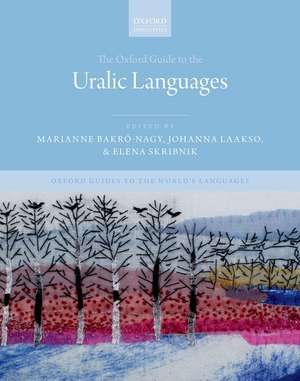The Oxford Guide to the Uralic Languages: Oxford Guides to the World's Languages
Editat de Marianne Bakró-Nagy, Johanna Laakso, Elena Skribniken Limba Engleză Hardback – 24 mar 2022
traditions; studies of certain languages and topics are somewhat limited and in many cases outdated. The Oxford Guide to the Uralic Languages brings together leading scholars and junior researchers to offer a comprehensive and up-to-date account of the internal relations and diversity of the Uralic
language family, including the outlines of its historical development, and the contacts between Uralic and other languages of Eurasia. The book is divided into three parts. Part I presents the origins and development of the Uralic languages: the initial chapters examine reconstructed Proto-Uralic and its divergence, while later chapters provide surveys of the history and codification of the three Uralic nation-state languages
(Hungarian, Finnish, and Estonian) and the Uralic minority languages from Baltic Europe to Siberia. This part also explores questions of endangerment, revitalization, and language policy. The chapters in Part II offer individual structural overviews of the Uralic languages, including a number of
understudied minority languages for which no detailed description in English has previously been available. The final part of the book provides cross-Uralic comparative and typological case studies of a range of issues in phonology, morphology, syntax, and the lexicon. The chapters explore a number
of topics, such as information structure and clause combining, that have traditionally received very little attention in Uralic studies. The volume will be an essential reference for students and researchers specializing in the Uralic languages and for typologists and comparative linguists more
broadly.
Preț: 1037.04 lei
Preț vechi: 1446.12 lei
-28% Nou
198.46€ • 206.02$ • 165.48£
Carte disponibilă
Livrare economică 21-27 februarie
Specificații
ISBN-10: 0198767668
Pagini: 1184
Dimensiuni: 230 x 284 x 62 mm
Greutate: 2.97 kg
Editura: OUP OXFORD
Colecția OUP Oxford
Seria Oxford Guides to the World's Languages
Locul publicării:Oxford, United Kingdom
Descriere
This volume offers the most comprehensive and wide-ranging treatment available today of the Uralic language family, a group of languages spoken in northern Eurasia. While there is a long history of research into these languages, much of it has been conducted within several disparate national
traditions; studies of certain languages and topics are somewhat limited and in many cases outdated. The Oxford Guide to the Uralic Languages brings together leading scholars and junior researchers to offer a comprehensive and up-to-date account of the internal relations and diversity of the Uralic
language family, including the outlines of its historical development, and the contacts between Uralic and other languages of Eurasia.
The book is divided into three parts. Part I presents the origins and development of the Uralic languages: the initial chapters examine reconstructed Proto-Uralic and its divergence, while later chapters provide surveys of the history and codification of the three Uralic nation-state languages
(Hungarian, Finnish, and Estonian) and the Uralic minority languages from Baltic Europe to Siberia. This part also explores questions of endangerment, revitalization, and language policy. The chapters in Part II offer individual structural overviews of the Uralic languages, including a number of
understudied minority languages for which no detailed description in English has previously been available. The final part of the book provides cross-Uralic comparative and typological case studies of a range of issues in phonology, morphology, syntax, and the lexicon. The chapters explore a number
of topics, such as information structure and clause combining, that have traditionally received very little attention in Uralic studies. The volume will be an essential reference for students and researchers specializing in the Uralic languages and for typologists and comparative linguists more
broadly.
Recenzii
This book is meant for a linguistically oriented readership worldwide, throughout linguistic and related disciplines...I assume that typologists world-wide will also be happy to see this volume.
The Oxford handbook may now be recognized as the most comprehensive and reliable general tool on the Uralic languages...One of the strong sides of the volume is that it consistently relies on the established methods of synchronic and diachronic linguistics without trying to make far-reaching linguistic conclusions by resorting to information from extralinguistic disciplines.
The Oxford Guide to the Uralic Languages is a work of great scope and significance. A project of this magnitude undoubtedly required an immense effort on the part of everyone involved, and the dedication of the authors and editors is apparent in many ways. With a work of such ambition, it would be a miracle were all expectations even met in the first place.






